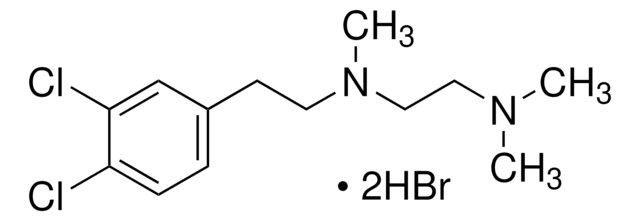SML0276
BD 1063 dihydrochloride
≥98% (HPLC)
Synonym(s):
1-[2-(3,4-Dichlorophenyl)ethyl]-4-methylpiperazine dihydrochloride, BD1063 dihydrochloride
About This Item
Recommended Products
Quality Level
Assay
≥98% (HPLC)
form
powder
storage condition
desiccated
color
white to beige
solubility
H2O: >15 mg/mL
storage temp.
room temp
SMILES string
Cl.Cl.CN1CCN(CC1)CCc2ccc(Cl)c(Cl)c2
InChI
1S/C13H18Cl2N2.2ClH/c1-16-6-8-17(9-7-16)5-4-11-2-3-12(14)13(15)10-11;;/h2-3,10H,4-9H2,1H3;2*1H
InChI key
NXFDBTLQOARIMH-UHFFFAOYSA-N
Application
- to study the in vitro and in vivo protective action of S1R against ferroptosis in hepatocellular carcinoma cells
- in a comparative evaluation of its anti-hyperalgesic action with that of the effects of N-(2-morpholin-4-yl-ethyl)-2-(1-naphthyloxy) acetamide (NMIN) in a chronic constriction injury model (CCI)
- to study the contribution of sigma receptors inhibition to the neuroprotective effects of memantine against amyloid-beta (Aβ)-induced neurotoxicity in SH-SY5Y cells
Biochem/physiol Actions
Other Notes
Signal Word
Warning
Hazard Statements
Precautionary Statements
Hazard Classifications
Eye Irrit. 2
Storage Class Code
11 - Combustible Solids
WGK
WGK 3
Flash Point(F)
Not applicable
Flash Point(C)
Not applicable
Certificates of Analysis (COA)
Search for Certificates of Analysis (COA) by entering the products Lot/Batch Number. Lot and Batch Numbers can be found on a product’s label following the words ‘Lot’ or ‘Batch’.
Already Own This Product?
Find documentation for the products that you have recently purchased in the Document Library.
Articles
Sigma receptors may constitute favorable targets for drug design in conditions such as psychiatric and movement disorders, amnesia, depression, cancer, inflammation and cocaine addiction.
Our team of scientists has experience in all areas of research including Life Science, Material Science, Chemical Synthesis, Chromatography, Analytical and many others.
Contact Technical Service








